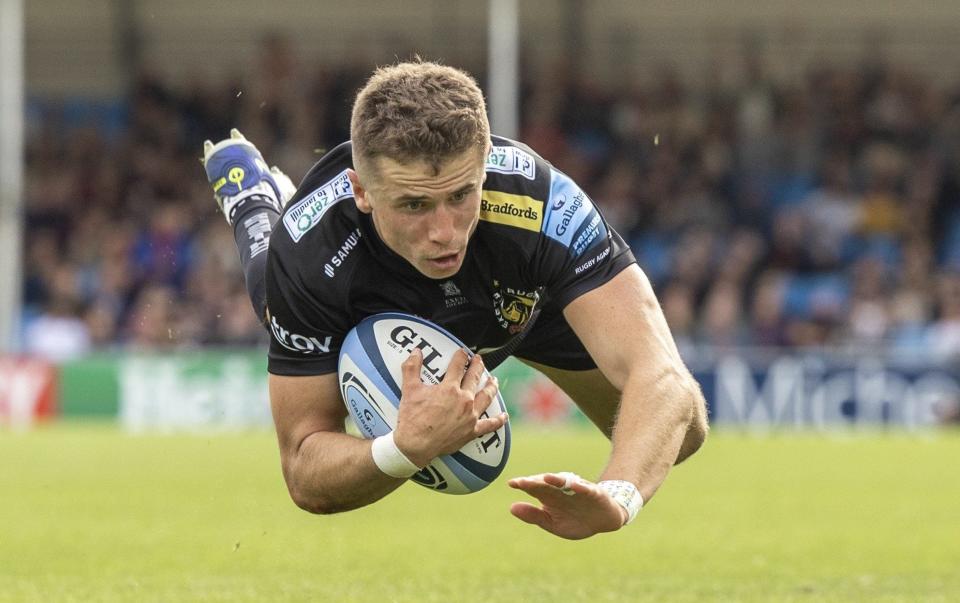The key to Exeter’s revival? It is all about the restarts

This has not, it is fair to say, been a dull start to the Premiership season. A glut of tries, Bristol going from strugglers to table-toppers and Worcester's crippling financial crisis have all dominated the news agenda but there is another intriguing sub-plot that may have escaped your attention: Exeter's attacking restarts.
A niche interest, perhaps, but the Chiefs' excellence in this area has been a key factor in their unbeaten start to the season. And at the heart of it all is Olly Woodburn. Currently uncapped, the 30-year-old wing has been with the Chiefs since 2015 but has developed into one of English rugby's most prodigious aerial talents.
"It's something I've always gone after," Woodburn, whose side face Sale tomorrow, tells Telegraph Sport. I've always enjoyed the aerial battle. It's such a good way to get momentum in the game; to get the ball right after they've scored or right after half-time."
"The switch, over the past couple of years, has been focusing more on the kick battle - with Haydn Thomas [Exeter assistant coach]. Harvey Skinner has been doing our restarts for most of the year and he's really coming on as a player - and he puts it in the spot most of the time. I'll give him some jip if he doesn't!
"We do some analysis and there are times when you want to kick away from players like Jonny Hill or Maro Itoje, for example - guys who are very good at taking restarts - but there are other players on whom you can focus, to get the ball back."
There is a strategy of sorts to Exeter's pre-eminence in this area, as director of rugby, Rob Baxter, and head coach, Ali Hepher attest. The duo admit, however, that Woodburn's salmon-esque leap-and-slaps are an individuality that is tough to coach.
"Olly Woodburn is exceptionally good at reading the flight of that ball," Baxter says. "He warms up standing under the posts and jumping up and grabbing the crossbar - he can really get off the floor.
"He won't spend time practising out-and-out restarts and chasing them but in backs' sessions they practice high-ball stuff. When you look at it, it is a one-man skill and he's very adept at it.
"Although we'd probably like to stop giving him so many reps [by conceding fewer points]. He's getting a bit too much practice at the minute!"
Hepher adds: "Olly's ability is incredible in the air. We are kicking off with a different kicker, too. Harvey Skinner hits a higher ball, which gives us the opportunity to then get underneath it. Not to throw Joe under the bus, it's obviously a bit of a work-on for him but his goal-kicking is incredible, so it's swings and roundabouts.
"The plan hasn't changed much this season. It obviously helps if you have vulnerable catchers underneath the ball and that they are targeted, but obviously you also have to think about who those vulnerable catchers are and who your super-strength guys are and obviously Woody on one side of the field is phenomenally good but, also, Jack Nowell has come up with a couple."

The strategy, Hepher explains, involves a multiple-option system with Exeter's players split on both sides of the field, meaning they can kick anywhere knowing they will be organised to chase effectively.
The aim of this is to identify and isolate "vulnerable catchers" in the opposition ranks, but the analysis does not stop there. Trends in the opposition's subsequent phase-play are identified pre-match and the restart formation is tweaked accordingly.
"How we're organised behind what Olly does takes some organisation," Baxter says. "We have walk-throughs and practice on it. There's a lot of things that we're doing that the guys have real clarity on this season. They're really on board, working hard and enjoying it."
If anything, the more intense work at Exeter historically has been on the almost rote learning associated with defensive restarts. Every Wednesday night, it was lifters v kickers - and they were not for the faint hearted.
"Rob always had a tough session on the end of a Wednesday," Hepher says. "It was always that the kick-catching pods would stand out there and the kickers would repeatedly restart high balls on them.
"There was always a lot of banter that flew around - they were always the most pressured kicks of the week. I think Ceri Sweeney [former Exeter and Wales fly-half] said it was more nerve-wracking than kicking at the Principality Stadium!"
On both sides of the ball, Exeter's accuracy in this oft-underappreciated area shows no sign of relenting.

 Yahoo Movies
Yahoo Movies 